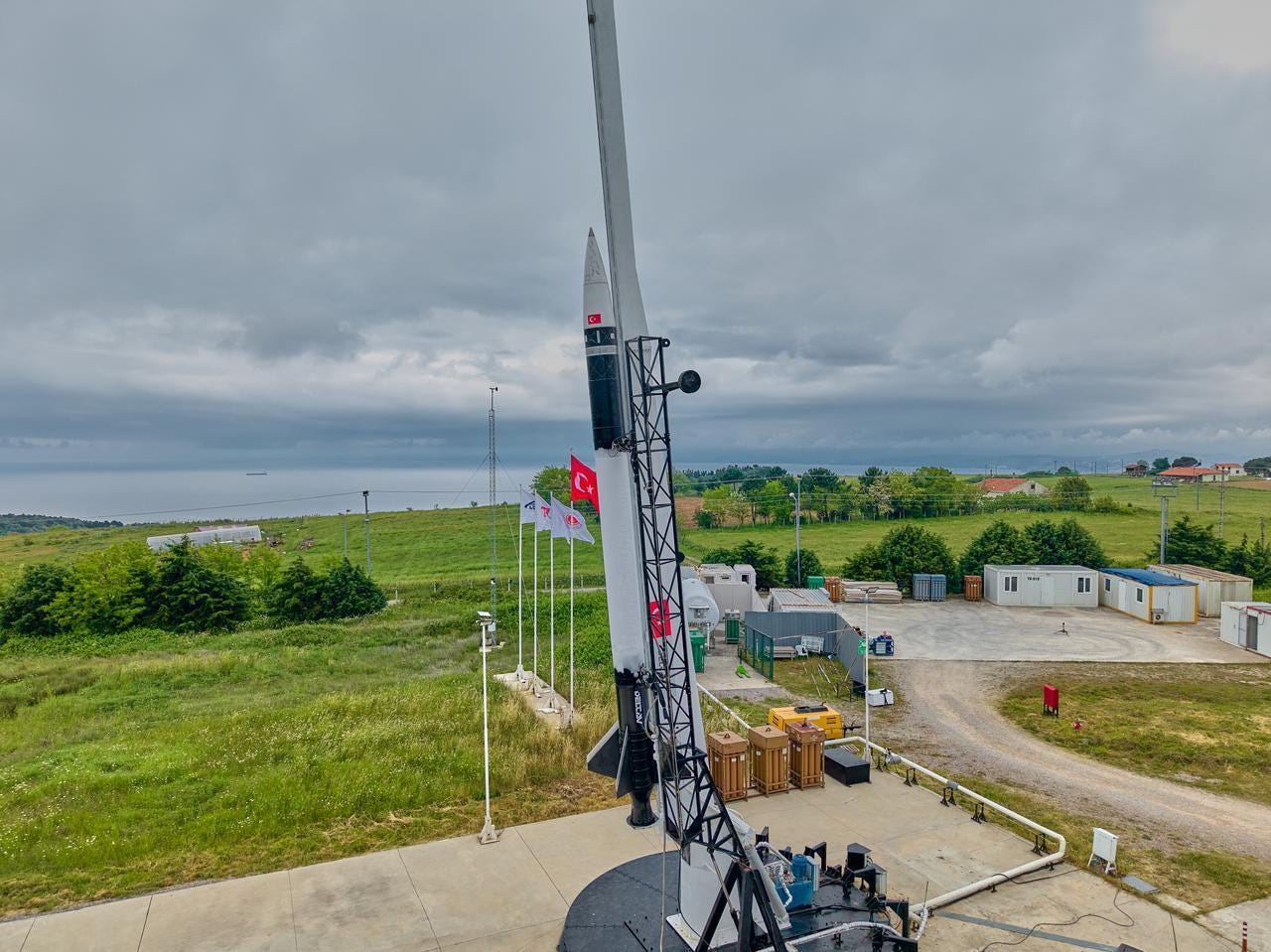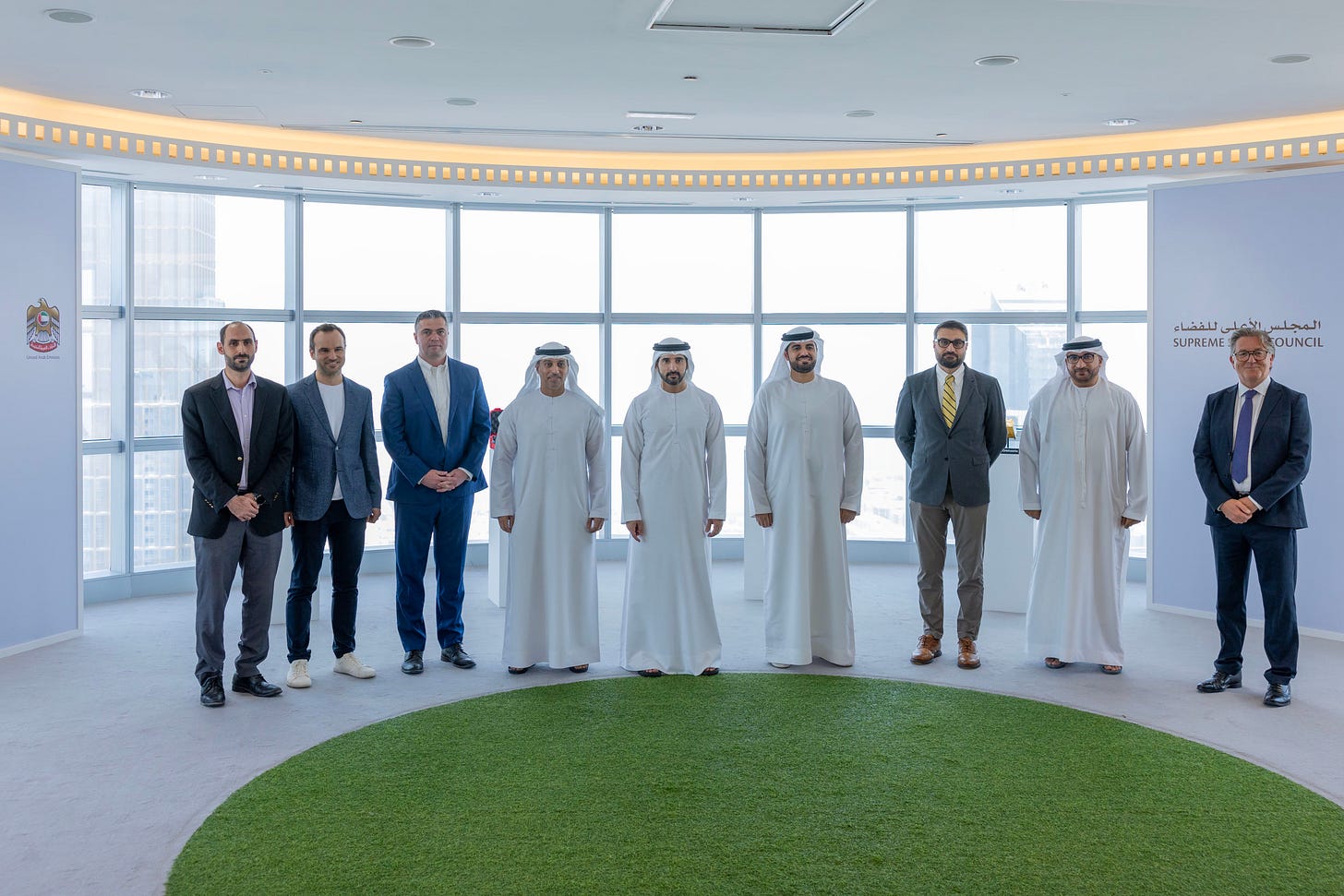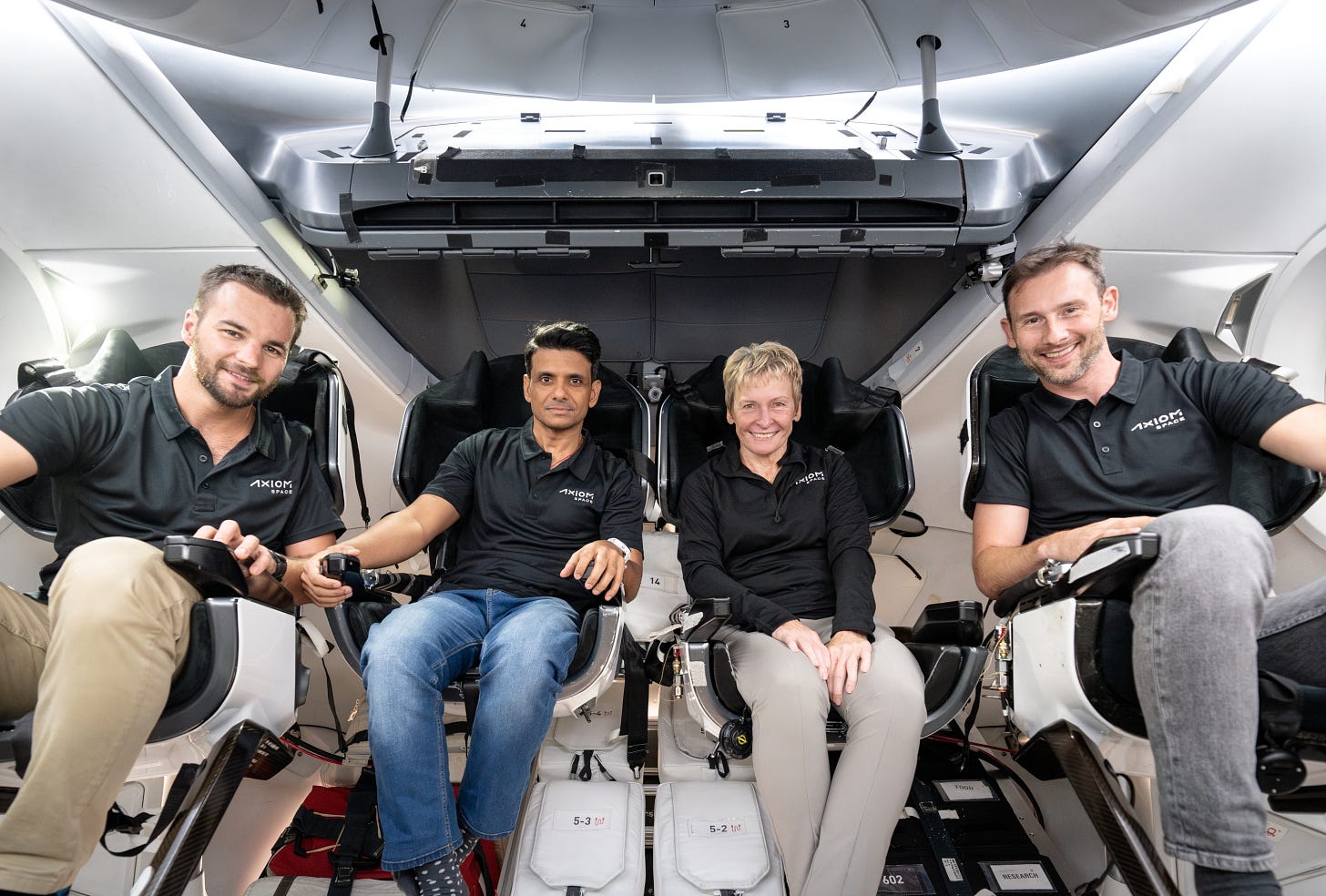Middle East Space Roundup: 9 to 15 June 2025
A summary of all the space news in the Greater Middle East over the past week, brought to you by AzurX

The following are the major space developments in the Greater Middle East region tracked by Middle East Space Monitor over the past week:
Israel-Iran Conflict: The Space Angle
Israel’s Arrow-3 Intercepts Iranian Ballistic Missile in Space
Israel’s successful exoatmospheric interception of an Iranian ballistic missile on 13 June 2025 using the Arrow 3 system marked a watershed moment in operational space-based missile defense. The Arrow 3 demonstrated its ability to destroy high-altitude threats in space using a kinetic “hit-to-kill” strike—offering strategic reassurance amid a massive Iranian barrage involving over 150 missiles and 100 drones. As part of a broader escalation following Israel’s deep strikes into Iran’s territory, the Arrow 3’s performance underscores both the maturation of space-enabled defense systems and the evolving role of missile defense in regional deterrence.
Amidst Conflict, Elon Musk Switches On Starlink Over Iran
Amid escalating regional tensions and internet blackouts in Iran following Israel’s strikes on Iranian nuclear sites, Elon Musk confirmed that SpaceX activated its Starlink satellite internet service over the country to counter regime-imposed restrictions. The move, aimed at restoring uncensored connectivity for Iranians, coincided with calls from Israeli Prime Minister Netanyahu and exiled royal Reza Pahlavi urging the Iranian people and military to oppose the Islamic Republic. Starlink’s activation signals the increasing role of commercial satellite networks in geopolitical crises and information warfare.
Israel Space Developments
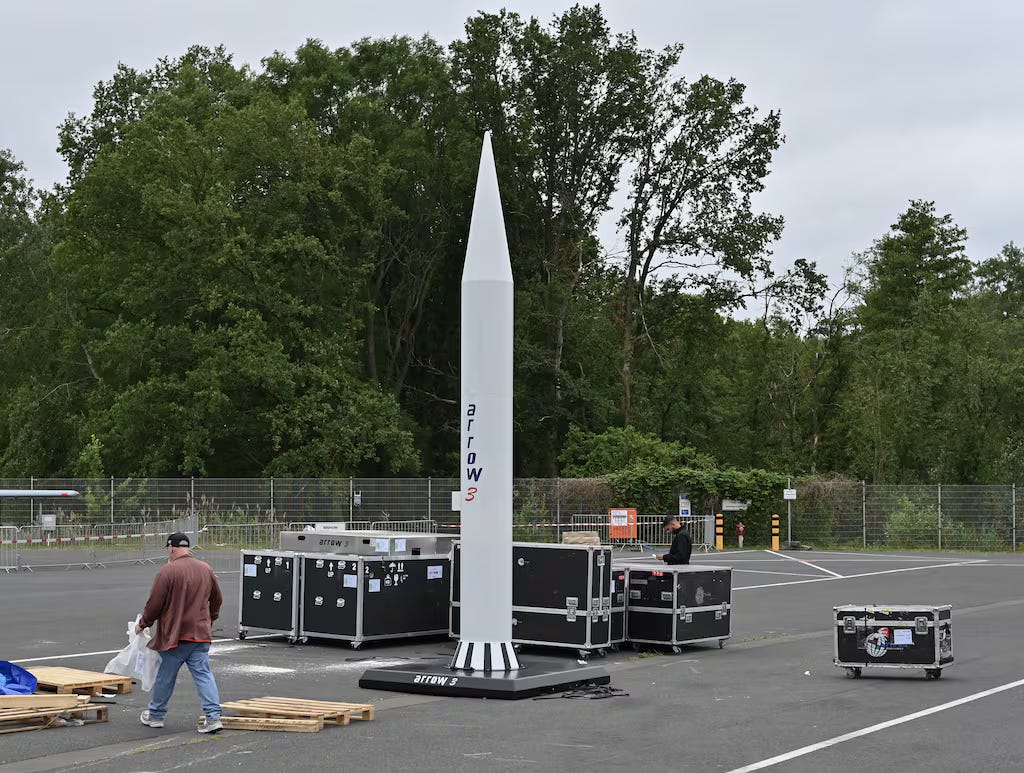
Israel & Germany Advance Preparations for Delivery of Arrow-3 Exo-Atmospheric Missile Defense System
Israel and Germany are advancing preparations for the delivery of the Arrow-3 exo-atmospheric missile defense system, marking Israel’s largest-ever defense export at $3.5 billion. Co-developed with the U.S., Arrow-3 is designed to intercept ballistic missiles in space using kinetic impact and will bolster German defenses amid heightened threat perceptions following Russia’s invasion of Ukraine. The system demonstrated its operational capability during recent interceptions of Houthi and Iranian missile attacks. Initial deliveries to Germany are scheduled for late 2025, signaling deepening strategic defense ties between Berlin and Jerusalem.
Israel’s Gilat Receives $27 Million Order for Stellar Blu IFC SATCOM Terminals
Israel’s Gilat Satellite Networks has secured $27 million in orders for its Gilat Stellar Blu ESA terminal technology, marking a significant advance in the company’s commercial aviation strategy. The high-performance, multi-orbit electronically steered array (ESA) terminal is gaining traction across commercial, business, and defense aviation sectors, meeting rising global demand for agile, scalable, and high-capacity airborne satellite connectivity. With deliveries expected over the next 12 months, this development underscores growing investment in next-generation aviation networks and Gilat’s strategic positioning within that expanding market.
U.S. Trade Tariffs Impact Israel, Other Middle East, Space Sectors
The Trump-era tariffs and ongoing U.S. trade uncertainty are reshaping global space industry dynamics, with implications reverberating across the Middle East. Israel’s Gilat Satellite Networks, via its U.S. subsidiary DataPath, sees opportunity in the push for domestic manufacturing, while regional partners like the UAE, Saudi Arabia, and others—already deepening sovereign space capabilities—may accelerate supply chain localization strategies in response to growing protectionism. As U.S. firms face higher costs and supply chain disruptions—particularly in sourcing aerospace-grade materials from countries like Germany, Japan, and Canada—space players across the Middle East may find strategic openings to attract investment, form alternative partnerships, and reduce dependency on U.S.-centric supply networks, especially as China actively offers space and satellite alternatives.
Türkiye Space News
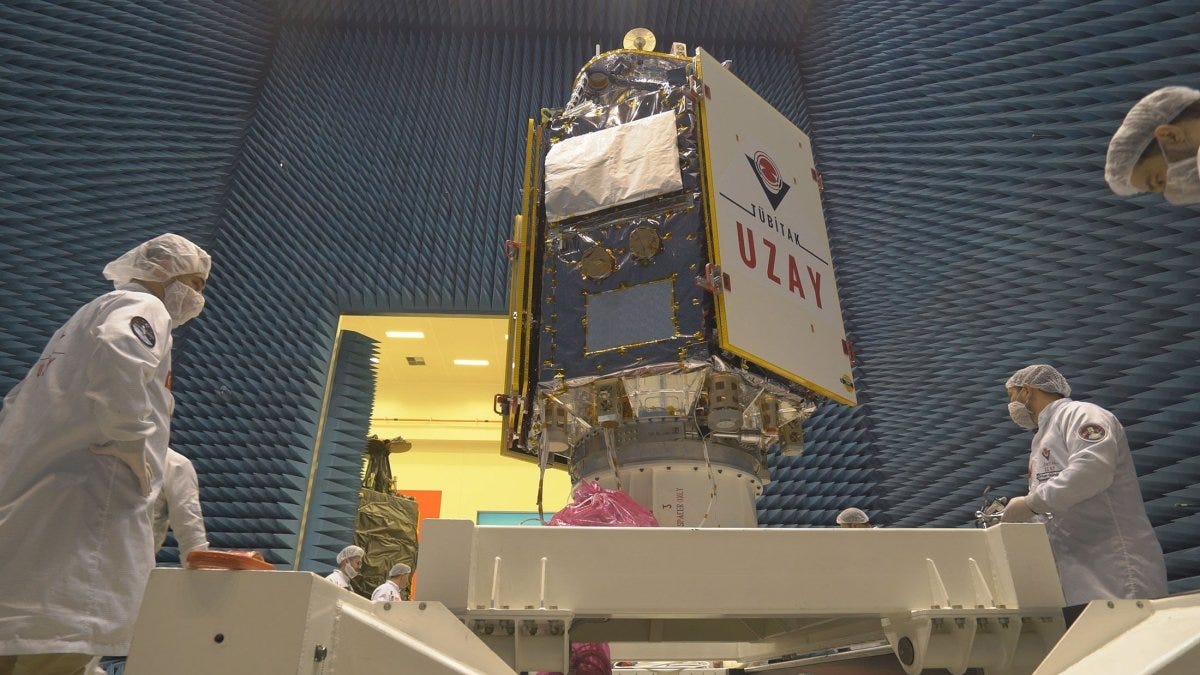
Türkiye’s Space Command Meets With U.S. Space Force to Discuss Cooperation
In a demonstration of growing bilateral cooperation, U.S. Space Force leaders met with Türkiye's Space Commander at Ramstein Air Base, Germany, on 5 June 2025 to advance shared strategic objectives in space within the EUCOM area of responsibility. The meeting affirmed the strength of the U.S.-Türkiye partnership and explored avenues for deeper collaboration between U.S. Space Forces Europe-Africa and Turkish Space Command, particularly in achieving coordinated space effects and enhancing regional space security.
Türkiye’s Türksat Bolsters Maritime Long-Range Identification & Tracking System
Türkiye has reinforced its maritime digital sovereignty with the domestically developed Long Range Identification and Tracking (LRIT) system, operated by Türksat, enabling real-time global monitoring of Turkish-flagged vessels. The system supports strategic functions such as marine accident response, search and rescue, and environmental security, while also covering a vast area up to 1,000 nautical miles beyond Turkish waters. Internationally validated by the International Maritime Organization (IMO), the LRIT system exemplifies Türkiye's commitment to maritime safety, cybersecurity, and digital transformation at sea.
Türkiye’s Türksat to Host New Era of Connectivity Forum on 19 June 2025
Türkiye is asserting its strategic ambitions in space through the "New Era of Connectivity Forum," hosted by TÜRKSAT, which aims to shape national satellite and digital infrastructure strategies. Showcasing domestic capabilities like the TÜRKSAT-6A and the forthcoming high-capacity TÜRKSAT-7A, the forum emphasizes Türkiye’s transition from satellite customer to sovereign provider. With a focus on multi-orbit systems (GEO, MEO, LEO), AI-integrated communication, and resilient digital infrastructure, the event underlines Türkiye’s push for digital sovereignty and its intent to become a leading actor in next-generation space technologies.
Türkiye’s DeltaV Successfully Launches Domestically-Built Hypersonic Rocket
Türkiye’s DeltaV has successfully launched a domestically developed hypersonic rocket—reaching 200 km altitude and Mach 5—marking a major milestone in its National Space Program. The test, which featured Türkiye’s first use of a hot-stage separation method, validates the capabilities of DeltaV’s HİSTEP hypersonic test platform and its hybrid propulsion system, also earmarked for the country’s planned Moon mission. This achievement strengthens Türkiye’s ambitions for independent access to space and highlights growing domestic expertise in dual-use aerospace and defense technologies.
UAE Space Developments
UAE’s Sheikh Hamdan Meets Local Space Startups, Backs Space Economic Zones Program
In a high-level meeting underscoring the UAE’s strategic focus on space innovation, Sheikh Hamdan bin Mohammed bin Rashid Al Maktoum, Crown Prince of Dubai, convened with founders and executives from leading space startups to reinforce the role of public-private partnerships in advancing the national space ecosystem. Emphasizing long-term investment, future technologies, and global competitiveness, the discussion highlighted the UAE’s commitment to becoming a premier space hub. Participants—including firms active in AI, IoT, remote sensing, robotics, microsatellites, and launch systems—praised the country’s regulatory and infrastructure frameworks, while backing initiatives like the Space Economic Zones Program as critical to sustainable sectoral growth.
UAE’s Al Khatim Observatory Contributes to NASA’s TESS Exoplanet Discovery
The UAE has marked a major milestone in astronomical research as the Al Khatim Astronomical Observatory confirmed the existence of exoplanets in collaboration with NASA’s TESS mission, reinforcing the country’s growing scientific credentials in space exploration. Now part of the TESS Follow-up Observing Program, the UAE employs advanced techniques to detect planetary transits beyond the solar system, aligning with its broader space ambitions. This breakthrough complements the UAE’s rapid progress in satellite deployment and lunar initiatives—solidifying the Emirates as a serious space science actor on the global stage.
UAE’s MBRSC Launches Its 2025 Career Camp for Young Emirati Space Talent
The UAE’s Mohammed Bin Rashid Space Centre (MBRSC) has launched its 2025 Career Camp to cultivate Emirati high school talent in space and STEM fields, offering hands-on exposure to scientific and corporate functions critical to the UAE’s space ecosystem. Running from 1 to 11 July 2025 at MBRSC’s Al Khawaneej headquarters, the initiative reflects the Centre’s strategic focus on developing a skilled national workforce aligned with the country’s long-term innovation and space ambitions.
Qatar Space News
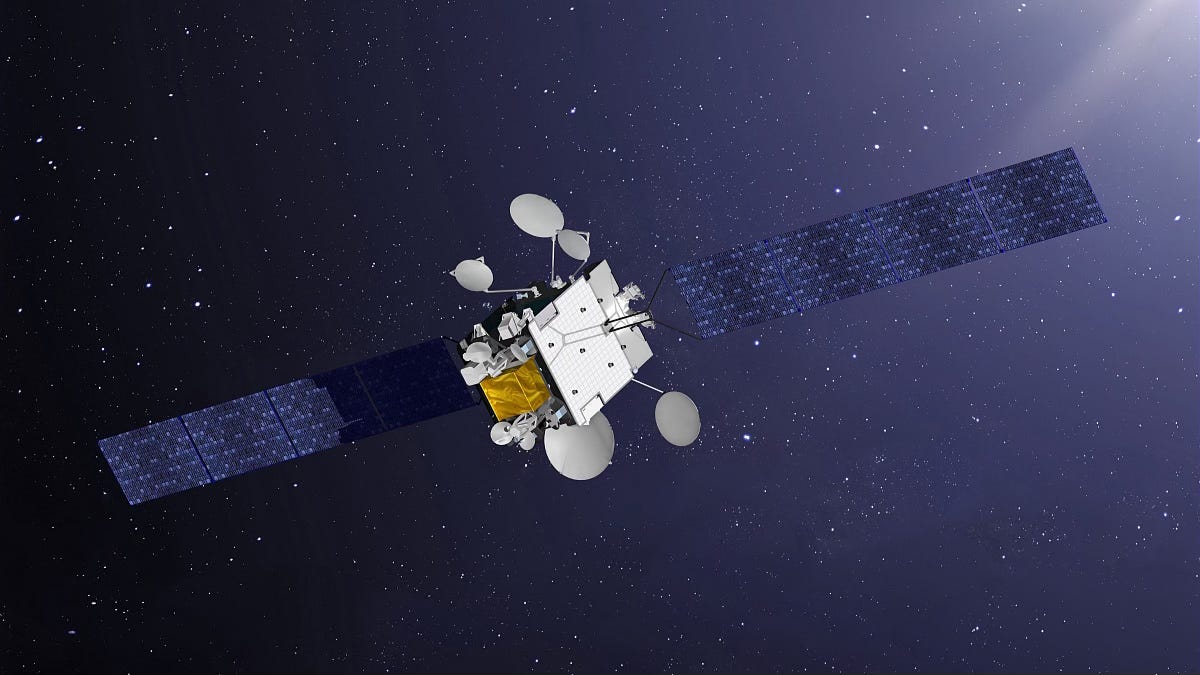
Report: Qatar Mulling Military Communication & Earth Observation Satellite Bids
Qatar’s Barzan Holdings is evaluating a high-stakes satellite procurement decision amid offers from Thales Alenia Space, Leonardo-Telespazio, and Roketsan, according to Tactical Report. The French proposal, centered on modified Syracuse IV (communication satellite) and Pleiades Neo (Earth observation satellite) platforms, offers advanced maritime and aerospace surveillance with potential co-production but is mired in disputes over sovereign TT&C autonomy and export control limits. The Italian and Turkish bids - both for Earth observation satellites - though technically less sophisticated, present lower geopolitical friction and faster deployment. Qatar is leveraging the competition to secure strategic autonomy, deepen local industrial capacity, and embed satellite resilience into its broader defense modernization strategy, with a final decision expected by Q3 2025.
Qatar’s Es’hailSat to Broadcast Algeria’s El Ikhbariya TV on Es’hail-2 Satellite
Qatar’s Es’hailSat has expanded its broadcast footprint by adding Algeria’s El Ikhbariya (A3) TV channel and five radio stations to its Es’hail-2 satellite platform at 26° East, enhancing regional media reach across the MENA region. The partnership with Algeria’s state broadcaster TDA underscores Es’hailSat’s role as a key enabler of regional content distribution, leveraging its dual-satellite system and Tier-4 teleport infrastructure to deliver high-quality, resilient services to public sector clients and broadcasters alike.
Other Regional Space Developments
Report: France Suspects Azerbaijan’s AzerSky-1 Disabled by China’s PLA in Cyber Attack
The unexplained failure in April 2023 of an Airbus-built Earth observation satellite - AzerSky-1 - operated by Azerbaijan’s Azercosmos has raised serious concerns within French defense circles, particularly following the recent detection of Chinese intelligence activity near key French space installations, according to Intelligence Online. French military sources suspect cyber interference by China’s PLA Unit 61486, known for targeting Western satellite assets, highlighting growing fears of hostile cyber actions against commercial and strategic space infrastructure.
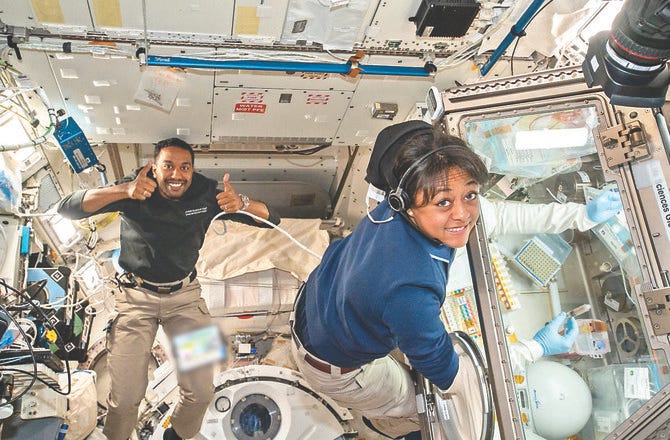
Opinion: Saudi Arabia Should Aim to Lead in Space Medicine
In Arab News, Canadian physician and commentator Dr. Farhan M. Asrar, writes that as Saudi Arabia accelerates its space ambitions under Vision 2030—joining international missions, launching astronauts, and signing the Artemis Accords—space medicine is emerging as a strategic priority. A leading Saudi space health expert argues that no crewed deep space mission can succeed without robust, autonomous healthcare systems tailored to the physiological and psychological challenges of space. With communication delays limiting Earth-based medical support, AI-powered health systems will be essential, aligning with Saudi Arabia’s national investments in data and AI. The case is clear: to lead in space, the Kingdom must invest in sovereign space medicine capabilities.
Oman Integrates Satellite Technologies for Food Security & Agricultural Sustainability
Oman is integrating satellite-based remote sensing and AI-powered analytics into its national agricultural strategy to boost food security and sustainability. Under Vision 2040, initiatives like the Million Date Trees Plantation Project employ satellite imagery, GIS, and drones to support precision agriculture—monitoring crop health, water usage, and pest threats in real-time. These technologies, alongside advanced irrigation and digitized farm management systems, aim to raise self-sufficiency to 70% and double cultivated land area. The use of space-enabled tools reflects Oman’s strategic embrace of tech-driven resource management in response to climate and food system challenges.

Armenia to Formalize Use of Satellite Data in Disaster Management & Response
Armenia's interior ministry has proposed new legislation to formalize the use of space-based information for disaster risk management, aiming to improve national resilience to climate and disaster challenges. Building on its status as an authorized user of the International Charter on Space and Major Disasters and its successful launch of two satellites since 2022, the measure seeks to institutionalize satellite data access, foster international and multi-sectoral cooperation, and strengthen local geospatial capabilities.
Astronomers From Morocco Part of Team to Discover Exoplanet TOI-6894 b
A team of international astronomers, including Moroccans Jamila Chouqar and Khalid Barkaoui, has discovered a giant exoplanet, TOI-6894 b, orbiting a star just one-fifth the size of our Sun—posing a challenge to prevailing models of planetary formation. Published in Nature Astronomy on 4 June 2025, the study highlights how this Saturn-sized planet, 53 times Earth's mass, unexpectedly orbits a small star in just over three days. Detected via NASA’s TESS and confirmed with ground-based telescopes, the discovery underscores the growing role of space-based observation in reshaping our understanding of planetary systems.
Saudi Arabia & UAE Contribute Experiments to Upcoming Axiom-4 ISS Mission
Saudi Arabia and the UAE are among 31 countries participating in the Axiom-4 (Ax-4) private space mission, which will launch imminently, aboard a SpaceX Falcon 9 to the International Space Station. The mission will conduct 60 experiments, including those advancing human spaceflight, biomedical research, and AI applications in orbit. While the UAE and Saudi contributions were not detailed individually, their inclusion signals deepening engagement with cutting-edge orbital science and space diplomacy. This reinforces both countries’ strategic ambitions in space exploration and R&D as they position themselves as emerging leaders in the global space ecosystem.
Sweden’s Requtech Expands into Middle East With Its LEO/GEO SATCOM Terminals
Sweden’s Requtech has secured its first sale of the RESA M Ku-band multi-orbit satellite terminal in the Middle East and North Africa (MENA) region, marking a key milestone in its global expansion strategy. Designed for both LEO and GEO constellations, the flat-panel, manpack terminal supports mobile and maritime applications and is qualified on Intelsat’s network. With deployments already underway in Europe, Asia, and North America, and plans to enter South America, Africa, and Australia by year-end, Requtech is positioning itself as a competitive player in the rapidly evolving global SATCOM mobility market.

Report Highlights Growing Space Ties Between Middle East and Latin America
Latin America is asserting a more strategic presence in the evolving global space race, not through direct competition with major powers, but by leveraging South-South partnerships - particularly with Middle Eastern countries - to overcome financial, technological, and regulatory barriers, according to Dr. Ariel González Levaggi, writing for the UAE’s Trends Research & Advisory think tank. While the region lacks independent launch capabilities and remains dependent on extra-regional actors for advanced services, initiatives like the Argentine-Turkish GSATCOM satellite, Saudi-Brazilian orbital cooperation, and the UAE’s EDGE Group defense-tech collaboration with Brazil signal a shift toward dual-use, sovereignty-conscious space development. These partnerships reflect a broader recalibration of Latin American space policy, balancing the need for autonomy with geopolitical pragmatism amid intensifying U.S.-China rivalry.

Be sure to catch up with space activities in the region in the next edition of Middle East Space Monitor’s space roundup!




